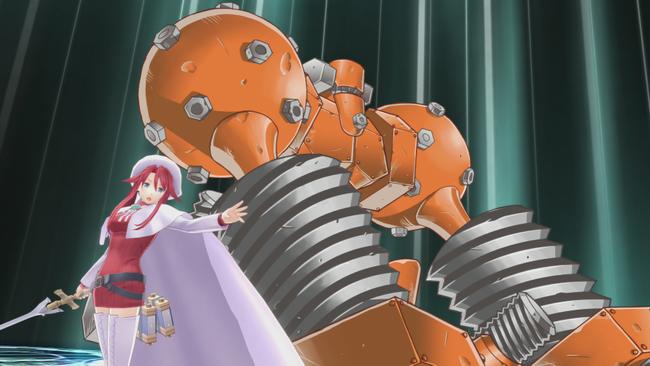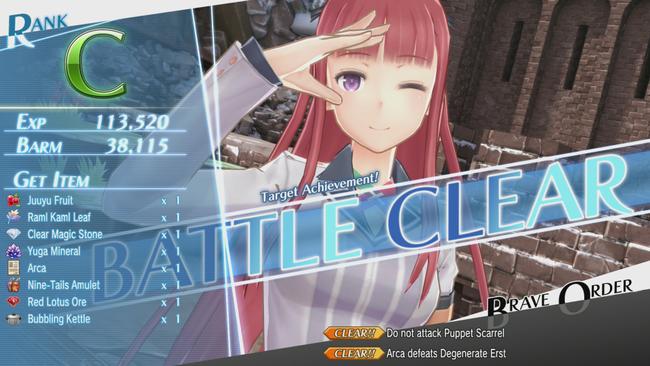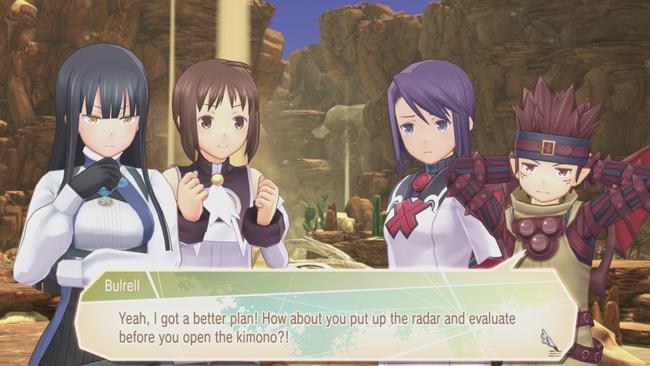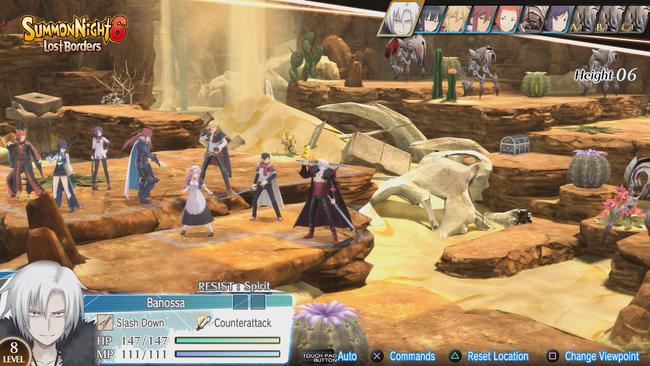
Summon Night 6: Lost Borders Review
Summon Night is one of those Japanese RPG series that hasn't really gained a foothold in the west, largely because most of the series has been left untranslated. Until 2015, the only titles that received English releases were spinoff games on Nintendo GBA and DS. Only recently did the small localization team at Gaijinworks decide to release a mainline game in the strategy RPG (or SRPG) series - Summon Night 5 for PSP - even well after the PSP had largely been retired.
It seems that project was successful enough for Gaijinworks that now it's Summon Night 6's turn to get a localization. This title is a bit different, though. While the other Summon Night games fall in the same timeline of events, Summon Night 6 is less a sequel and more of a fan-service/festival game featuring most of the main characters from the rest of the SRPG series. That puts a small wrinkle in the character identity of the game when most western players are not familiar with the cast.

The story premise for Summon Night 6: Lost Borders is somewhat simple but a bit strange. The main two characters, Raj and Amu, live alone in the isolated and barren world of Fillujah, separate and unaware of each other. They have no parents, no memories of their childhood, no history to speak of at all. All Raj and Amu have is a flying quilt creature at their side as their only friend.
In this strange world, various items fall from the sky, literally. Cans of beans, furniture, tools, even whole buildings - they just fall from the sky for seemingly no reason at all. The two leads survive by gathering what they can and living off of these mysteriously appearing pieces.
In addition to these strange falling objects, dangerous husks of creatures known as Zyrls have started to appear on Fillujah. Raj not only needs to collect items to survive but to also stay safe from these zombie-like monsters. That's the way it's always been and the way it was always going to be until something different fell from the sky - another human.
The game starts with Raj as he stumbles across Magna and Hasaha, who are characters from Summon Night 2. They've been mysteriously transported from their own world into this strange new one. Without much to go on, Raj teams up with them to help them find a way home and to protect each other from the Zyrls.

Throughout the game, Raj and Amu will meet many, many characters from other games in the series. But they aren't always friendly. Sometimes they will appear in Fillujah possessed by a mysterious force, and the growing team of characters will need to knock some sense into their friends to get them acting like their usual selves again. Occasionally series' villains will also make an appearance and provide some antagonism for the cameo cast.
Summon Night 6 is divided into chapters - 25 in total - and each chapter basically follows the same basic formula. The group meets another character from an earlier Summon Night game, followed by some enemy to beat (whether it is a possessed protagonist or a series' villain from an earlier title), and then the characters discuss what might be happening and how to find a way home.
This formula holds for about 85% of the game and ends up being quite cyclical and repetitive. The same talking points are rehashed multiple times: bringing a friend back to their senses, discussion on how characters are from different time periods (and sometimes different timelines), and hypothesizing how they can get things back to normal.
Despite being a numbered title, Summon Night 6 doesn't have much to go on when it comes to an actual storyline. Instead, by far most of the dialogue in the game centers around character interactions. In between missions, many scenes can be viewed between an assortment of characters discussing all sorts of topics with each-other, from food to clothing to personalities to fighting styles to academics and everywhere in between. It is enjoyable to see the large cast interact with each other so often, but English players might not get all the context behind everything if they have not played other Summon Night games.
Night Conversations also return from Summon Night 5, where Raj/Amu get a chance to speak alone with another character in a more personal setting. These conversations mostly work just as a light social element to the game with an even lighter 'dating sim' element. As you might expect, there are a lot of characters to choose from, and you won't even come close to seeing all of the possible conversations in a single playthrough. I spent most of my night conversations having Amu speak with Natsumi - one of the main characters of the original Summon Night - who formed a strong friendship over the game and affected a small cutscene near the end.

In a sense, the average English player is put into the same perspective shoes of Raj or Amu, as they are meeting all of these characters for the first time. I had played Summon Night 5 beforehand so I was already familiar with most of the terminology and portions of the cast, but I had to keep a wiki open to keep track of which characters were from which games.
In typical Gaijinworks style (and Working Designs before them), the localization is often colorful and full of personality. It's hard to say how faithful, exactly, the script is to the original, but an interesting read, at least. While still often silly, I did feel that the dialogue, in general, was a bit more grounded relative to Summon Night 5, which tended to be a lot wackier. While the dialogue is somewhat enjoyable, the English voice-over work in Summon Night 6 is largely mediocre, and I strongly recommend turning voices off and playing the game silently; there's no dual audio to be found here.
As for the game itself, Summon Night 6 is an SRPG that plays very similarly to its PSP predecessor, with the main advantage being that more characters and enemies can participate in battles than what was possible on the strained psp hardware. There is no job system or much equipment management to speak of. Most of the game revolves around inherent character stats and skills, with many skills being of the passive variety. Skills are learned with SP points that participating characters gain in battle.
There is a class system as well, but it's mostly just a way to affect stat distribution a bit when your character meets a certain level. While a few skills and passive bonuses are unique to certain classes, it largely doesn't affect a character's utility in battle. There are plenty of characters to choose from, and it's best to pick a balanced team of melee units and spellcasters and to stick with, rather than trying to level everyone evenly.

Overall, I feel like my critiques of the combat system in Summon Night 5 largely carry over to here. The gameplay stays pretty simple throughout, and the Normal difficulty is more-than-manageable the whole way through (you can change to Hard and back at will). Most mission objectives, once again, default to: 'defeat all units' or 'defeat the boss(es)', which is a little disappointing that mission objectives never get more creative than that. There are optional objectives in each mission as well, but they usually simply involve having a certain character kill enemies or preventing a character from getting KOed. I feel like keeping things so straightforward on this front is a bit of a missed opportunity.
Most combat encounters in the game play so similarly to each other that I kinda felt like I was just going through the motions at times and no particular maps or battles stand out from the rest. That's not to same the overall strategy systems in Summon Night 6 are poor. They are just missing the extra push to really become something truly great, so as it stands combat in the game is merely acceptable instead of remarkable. The lack of interesting and meaningful shake-ups in the gameplay make the repetitive chapter loop a little more frustrating.
Summon Night 6: Lost Borders is a good enough SRPG that misses the opportunity to really stand out from the crowd. It doesn't excel in any particular facet, but it provides an interesting look for fans of the genre. If you can't get enough of SRPGs, give Summon Night a shot, but it's not going to click for everyone.